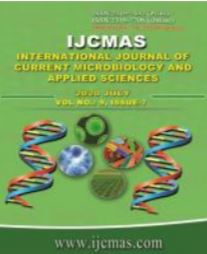


 National Academy of Agricultural Sciences (NAAS)
National Academy of Agricultural Sciences (NAAS)

|
PRINT ISSN : 2319-7692
Online ISSN : 2319-7706 Issues : 12 per year Publisher : Excellent Publishers Email : editorijcmas@gmail.com / submit@ijcmas.com Editor-in-chief: Dr.M.Prakash Index Copernicus ICV 2018: 95.39 NAAS RATING 2020: 5.38 |
The present study was conducted to evaluate Bt cotton hybrid namely “BG 6488 II” under PEG induced drought stress. Different physiological and biochemical attributes were observed to see whether the plants which were exposed to water deficit stress were acclimatized to the drought stress by altering their metabolism at the later stages of the plant life cycle. Water deficit condition was induced after 60 days of sowing at the reproductive stage by applying 20%, 40% and 60% solution of PEG 6000 and observations were recorded 3 and 6 days after treatment (DAT). A significant decrease in physiological parameters like quantum yield of photosystem (PS) II and relative water content was observed under water deficit conditions after 3 DAT. Membrane injury, MDA content and H2O2 content increased significantly with increasing stress conditions. But to alleviate the deleterious effect of drought stress the antioxidant enzymes like catalase and peroxidase were upregulated and osmolytes like proline, total soluble sugar and total soluble protein content also increased with increased PEG 6000 concentration. On the other hand, plants after 6 DAT shows some acclimation to drought by increase in quantum yield of PS II, total chlorophyll content& relative water content and also shows less increase in MI, MDA content and H2O2 level. Similarly, catalase and peroxidase level further increased other osmolytes like proline, total soluble sugar and total soluble protein content was also increased more than 3 DAT. Taken together our findings suggest that although the plants were affected negatively by drought stress initially but they also got acclimatized to the new stress environment to sustain their life by alterations in their integrative metabolism.
 |
 |
 |
 |
 |